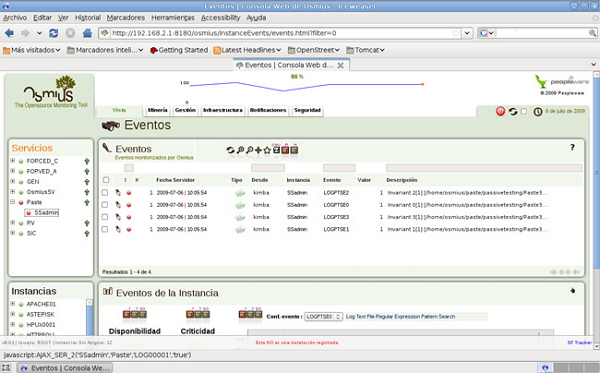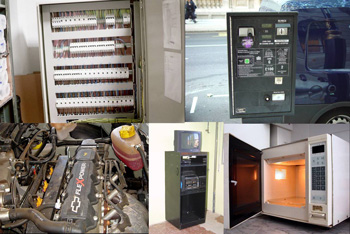RIGUROUS ASSESSMENT OF THE QUALITY OF EMBEDDED AND REAL TIME SYSTEMS
|
Description |
The research group in Design and Testing of Realiable Systems of the UCM is dedicated to the development of formal frameworks for the system testing process and the evaluation of its performance.
The application of rigorous methods is especially relevant in systems where, due to security reasons, it is necessary to establish that during the development process there have been no errors. In fact, its use in the initial stages of the development process, during the establishment of requirements and its specification, increases its effectiveness. However, their applicability is not restricted to these levels and can be used throughout the development cycle.

Image of the integration of: Osmius, commercial monitoring tool, and PASTE, research group testing tool.
Real-time systems are present in our daily lives: airplanes, cars, televisions, washing machines, microwaves, mobile phones, etc. The main feature of these systems, which distinguishes them from other types of systems, is the interaction time. This property requires that the evaluation of the correct functioning of a system depends not only on the logical result produced but also on the time in which that result occurs. Therefore, a real-time system requires, in order to be considered correct, to issue the correct answers and to meet the established temporary restrictions.
Numerous examples of such systems exist where a failure in their temporal functioning would be unacceptable. For example, software in charge of controlling an artificial respirator, managing a car engine, operating a pacemaker, updating flight plans, etc. These systems must, therefore, be fault-free since otherwise it would bring catastrophic consequences. There are other systems where these failures in their temporal behavior are acceptable but should be reduced. For example, the clocks associated with washing machines, microwaves and ovens belong to this second type.
|
How does it work |
In order to provide a methodology that can be easily adapted to systems that consider different temporal domains, an integrated testing framework has been proposed that can be used to deal with fixed times, time intervals or random variables, depending on the required specification by the system.
The use of this new testing methodology will provide system designers with flexibility in selecting the most appropriate temporal domain in each case, as well as the possibility of applying it in a large number of systems in which the required temporal notions Different degrees of accuracy.
It should be noted that the use of formal representations of the systems allows a rigorous analysis of their properties. In particular, it allows to establish the correction of the final system with respect to the specification, the fulfillment of the conditions required for it, the level of preference of one system over another based on a certain criterion, the existence of possible wrong behaviors, etc.
|
Advantages |

The guarantee of the quality of the systems through rigorous testing techniques is a protection activity. Its main objective is to find errors during the initial stages of development to prevent them from spreading to later phases or become defects after the delivery of the system.
These technologies emphasize failures in temporal aspects that usually go unnoticed and that lead to an increase of the costs of review and maintenance of the systems.
|
Where has it been developed |
The research group Design and Testing of Realiable Systems of the UCM has a long experience in the definition and application of rigorous methods for the specification and analysis of systems. This experience is supported both by its numerous publications and by its participation in European projects, the National Plan for R & D & I and ITEA II for industrial developments and in specific collaborations with companies through contracts covered by Article 83 of the LOU.
During the last years the group has developed different methodologies, based on formal methods, for the testing of systems that present temporary restrictions regarding the execution of the actions that may take place in them. These techniques cover the application of tests for the verification of these properties and the obtaining of diagnoses regarding the correction of the systems. These techniques have been evaluated both in specific collaborations with national industrial partners and in the analysis of communication protocols associated with mobile networks.
|
And also |
The techniques developed by the group represent a good compromise between formal methods with a strong mathematical base (impracticable on an industrial level) and the activities of handmade testing used mostly in industry. More importantly, the techniques of the research group place particular emphasis on ensuring the correct behavior of systems regarding their temporal aspects, which are not treated with sufficient importance during the testing phases of the system.
|
Contact |
|
© Office for the Transfer of Research Results – UCM |
|
PDF Downloads |
|
Classification |
|
Responsible Researchers |
Luis Fernando Llana Díaz: llana@sip.ucm.es
María de las Mercedes García Merayo: mgmerayo@fdi.ucm.es
Department: Computer Systems and Computing
Faculty: Computer Science


